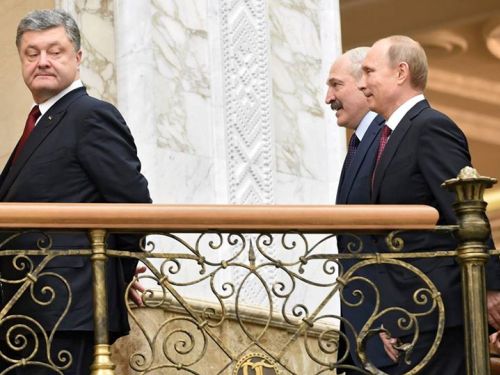Poland and Germany were both initiators and drivers of a New Eastern policy linked to the Eastern neighborhood and Russia/Soviet Union.
Andrei Yahorau: Russia needs a frozen or even a smouldering conflict at the east of Ukraine

Minsk negotiations can be the first step to peace, after which concrete actions will follow: ceasefire, removal of military propaganda, i.e. successive implementation of agreements.
Negotiations of Normandy Four on Ukraine that started in Minsk at the evening of February 11 have lasted for the whole night. But no one was expecting that the way to peace would be easy anyway.
After a five-hour negotiation marathon a TV-channel Russia24 informed that the leaders of the countries-participants of negotiations might make their own statements; however, there will be no Q and A session, which is a bad sign in itself.
The course of negotiations of the Normandy Four in the interview with EuroBelarus Information Service was commented upon by Andrei Yahorau, the Director of the Center for European Transformation.
— Why did Putin come to Minsk? Judging by the activation of military actions at Donbas, it seems that he didn’t come to agree upon peace.
— Indeed, it doesn’t look like Russia is aiming at peaceful settlement of the conflict. The continuation of hostilities and aggressive nature of Russian propaganda adds to that; i.e. there are no signals that testify to the readiness to come to an agreement.
— Germany and France have suggested a new peaceful plan: Ukraine’s federalization and creation of a 50-70-kilometer demilitarization zone. The official Kiev categorically rejected the federalization variant. Is compromise possible?
— We don’t know much about the suggested plan. Merkel and Holland might have insisted on the implementation of Minsk agreements. Ukraine’s “federalization” as understood by Russia is unacceptable for Ukraine. Ukraine’s Verkhovna Rada has already made considerable concessions by adopting the status of Donetsk and Luhansk regions within the frames of implementation of the same Minsk protocol. It has long ago become obvious that it is not about federalization and that Russian doesn’t need any federalization. Russia needs a frozen or better a smouldering conflict at the east of Ukraine, and all its actions and conditions are aimed at that. Such conflict aggravates inner political situation in Ukraine, complicates the reformation process and problematizes the issues of realization of important parts of EU Association Agreement (such as introduction of a free-trade zone).
— A DPR representative stated that Ukraine’s coalition-free status is a basis for political settlement of situation in Donbas. Will Ukraine refuse rapprochement with NATO?
— Now Ukraine is interested in the opposite. However, if Russia would really like to agree upon peace, Ukraine’s coalition-free status might become a point at issue and one of the possible concessions to Moscow.
— Russian Minister for Foreign Affairs Sergey Lavrov at the press conference in Moscow linked transfer of control over the border to Ukraine with the Kiev’s refusal from economic blockage of the territories. Basically, Kremlin is demanding that Ukraine funds the terrorists and insists on recognition of DPR and LPR as subjects of international law, isn’t it?
— This is a new diplomatic art: put forward more and more new absurd and unacceptable offers. They could as well offer to provide separatists with weapon. Economic blockage will automatically end up with restoration of Ukraine’s control over its eastern regions.
However, the problem of social payments is not absolutely unequivocal: Donetsk and Luhansk is inhibited by Ukrainians, and not all of them are supporting the separatists. In a certain sense all people who came to be at the occupied territories were recorded as collaborators, which is not very fair. But on the other hand, we can also understand Ukrainian government, which doesn’t want to give budget money to the regions where it can’t control their distribution.
— Even if the meeting of the Normandy four ends up with adoption of common declaration, will the negotiation lead to peace?
— The negotiations themselves can only be a first step to it; but actions should follow: ceasefire, removal of military propaganda, i.e. successive implementation of agreements.
Others
-
Uladzimir Matskevich: The sooner the "Union State" is denounced, the better for Belarus
Not only does the “Union State” undermine the establishment of civilized relations with Europe, but it hinders the possibility of normal relations between Belarus and Russia.
-
Uladzimir Matskevich: The regime can no longer control the situation in the country
The authorities are unable to prolong the social contract with the people: there is no way out of the social crisis.
-
Press release of the BNP in connection with the next round of the dialogue in the format of the EU-Belarus Coordination Group
Belarusan National Platform of the Eastern Partnership Civil Society Forum welcomes the dialogue process in the format of the EU-Belarus Coordination Group, the third round of which was held in Minsk on 3-4 April 2017.
-
Hennadiy Maksak: Europe must react adequately to the events in Minsk
A new wave of political repressions should make the EU return to tougher policy towards the Belarusan regime.








Comments
From farewell to a new Eastern policy and towards a new development
Poland and Germany were both initiators and drivers of a New Eastern policy linked to the Eastern neighborhood and Russia/Soviet Union.